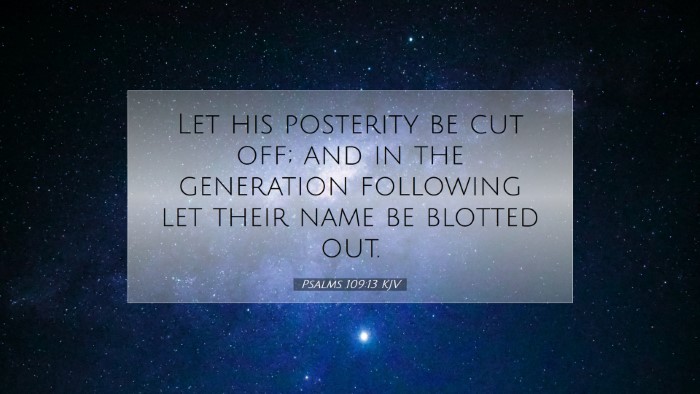Commentary on Psalms 109:13
Bible Verse: "Let his posterity be cut off; and in the generation following let their name be blotted out." (Psalms 109:13, KJV)
Introduction
The 109th Psalm is one of the most imprecatory psalms, containing strong prayers for vengeance against foes. This particular verse, Psalms 109:13, reflects a severe wish for the total obliteration of the lineage and memory of the psalmist's enemies. Through this analysis, we will summarize insights from renowned public domain commentaries, aiming to highlight the theological, devotional, and historical significance of this verse for pastors, students, theologians, and Bible scholars.
Theological Insights
This verse emphasizes the themes of divine justice and retribution. The psalmist's plea for the enemies' name to be blotted out indicates a strong attachment to the covenantal context in which one’s lineage is seen as a sign of God's blessing or curse.
-
Matthew Henry:
Henry elucidates that such proclamations are not mere bursts of human anger, but rather invoke the judgment of God. He interprets this desire as an appeal to divine justice, where the psalmist seeks to uphold God's honor against those who have wronged him. Henry suggests that this desire for the enemy's lineage to be cut off points to the overarching biblical theme where God's covenant with His people establishes a divine continuity that the psalmist feels is threatened by his adversaries.
-
Albert Barnes:
Barnes provides a comprehensive commentary on the implications of the term "cut off." He notes that in ancient Israel, the identity of a person was intimately connected to their family line. The desire expressed by the psalmist is viewed as socially and morally significant. Barnes argues that in the context of the ancient Near Eastern worldview, a complete destruction of an enemy's name would serve as a warning to others, reflecting God's ultimate authority and righteousness.
-
Adam Clarke:
Clarke's commentary explores the idea of "name" being synonymous with reputation and legacy. He remarks on the importance of legacy in Israelite thought—where one's name carries weight not just in this life but in the generations that follow. The psalmist’s petition, thus, embodies a deeper yearning for justice, ensuring that the wrongdoing perpetrated against him would not stand unpunished and that such evil would not be remembered or repeated in future generations.
Historical Context
Understanding the historical backdrop of Psalms 109 enriches the interpretation of this verse. The psalm is believed to have been written during a time of significant personal distress for David, possibly in the wake of betrayal by close associates. This context of suffering highlights the complexity of invoking curses amidst personal anguish.
-
Matthew Henry:
Henry connects the textual history with David's experiences, specifically how the psalm reflects a cry for justice against those who betrayed him. David is seen not just as a king but as someone responding to personal betrayal, making this plea as much about his legacy as about societal integrity.
-
Albert Barnes:
Barnes delves into the cultural practices of cursing one's enemies in the Hebrew tradition, suggesting that these were often seen as rightful appeals to God’s justice rather than mere malice. This cultural understanding sheds light on the intensity of David's feelings and underlines that such imprecations were a part of the tradition of lament found throughout the Psalms.
-
Adam Clarke:
Clarke emphasizes the prevailing social mores regarding consequences for actions in the ancient Israelite community, noting that a name blotted out acts as a public declaration of the inability to withstand God's judgment. The historical setting thus becomes integral to appreciating why a psalmist would not only wish for retribution but also seek to affirm God’s dominion over all affairs.
Application for Life and Ministry
In practical terms, this verse challenges readers to examine the nature of their responses to personal grievances and injustices. While most contemporary readers may recoil from the severity of the psalmist's wish, it's crucial to recognize the emotions underlying such desires for justice.
-
Matthew Henry:
Henry encourages a pastoral approach to understanding these texts, suggesting that they allow us to express genuine feelings of hurt while ultimately leaving vengeance in the hands of God. The psalmist’s model invites believers to seek God in their distress and to trust in His ultimate justice.
-
Albert Barnes:
Barnes posits that such scriptures provide depth to the Christian understanding of grace and forgiveness. While the feelings of betrayal are valid, the New Testament revelation calls for a movement towards reconciliation and love, urging believers to echo the sentiments of Christ in forgiving His enemies.
-
Adam Clarke:
Clarke's application emphasizes the transformative power of God’s justice, urging ministers and theological students alike to focus on how the concepts of mercy and grace fulfill the lament of Psalms. It advocates that through prayer and reflection, one’s heart can be aligned towards healing rather than destruction.
Conclusion
Psalms 109:13 serves as a complex reflection on themes of justice, personal grief, and the emotional dimensions of faith. By combining insights from Matthew Henry, Albert Barnes, and Adam Clarke, we can appreciate the depth of this verse within its scriptural context and personal application. It invites believers to immerse themselves in the biblical narrative of justice while underscoring the grace and mercy found in Christ's teachings, thus inviting a balance between righteous anger and redemptive love.


